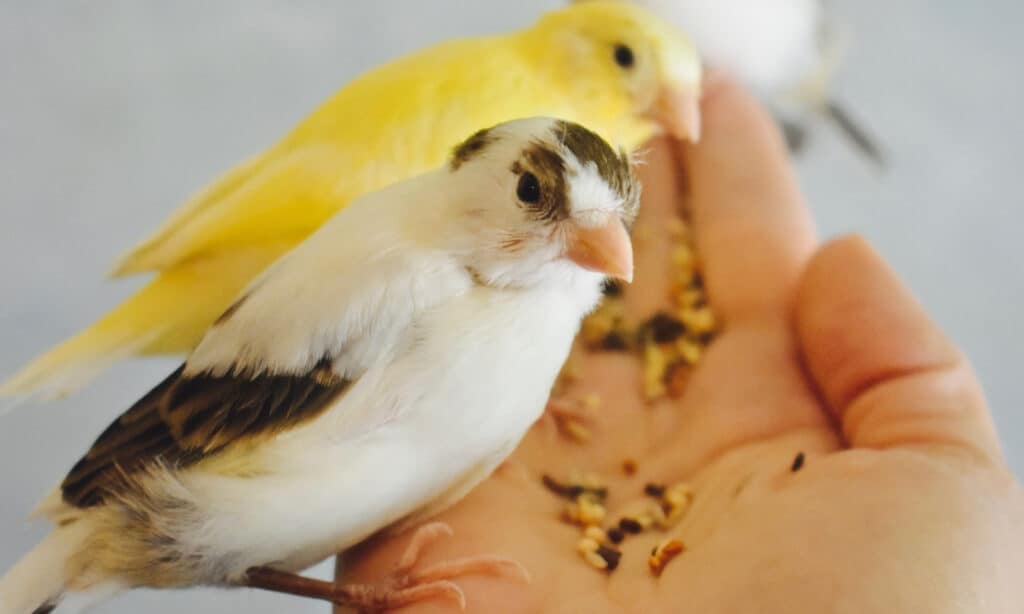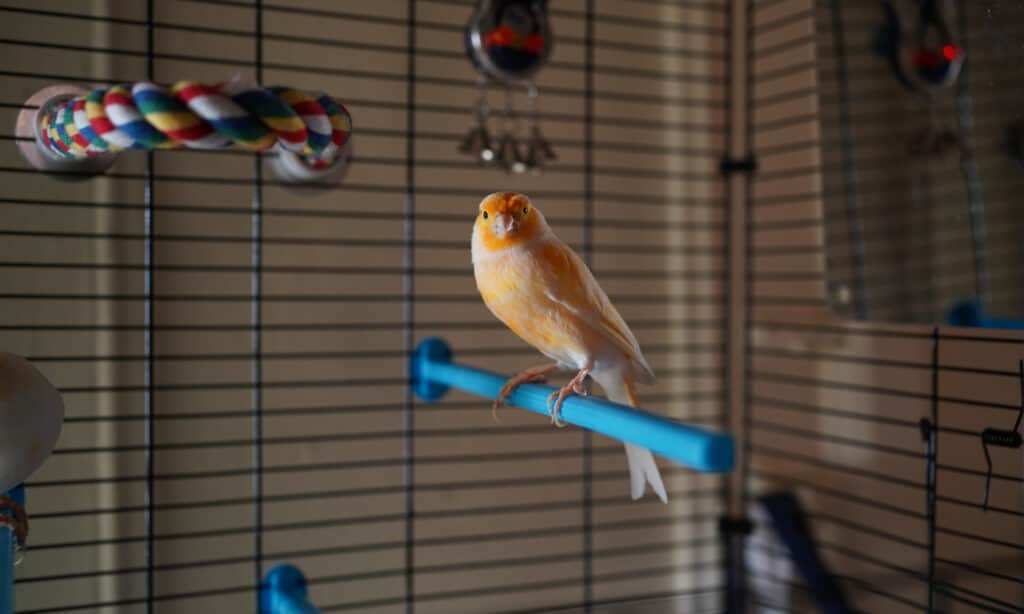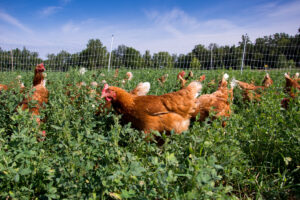Before Buying a Canary
Canaries are smart little birds from the finch family that are native to the Macaronesian islands of the Azores, Madeira, and the Canary Islands. Of course, today’s canaries are only distant reminders of their original bloodline first bred in captivity in the 1600s. But they still make great caged pets, gracing their owners’ homes with song, color, and sunny dispositions.
It is important to know that, if you seek a songbird for your home, a male canary will keep you entertained with beautiful music. But females tend to only chirp instead of creating lengthy melodies. It is equally important to know that you should only keep one canary per cage unless you choose a breeding pair of opposite genders. Two males or two females should not be caged together because they will likely fight and cause each other injury.
Canaries need cages large enough for stretching their wings and, ideally, flying. Otherwise, they are perfectly happy to jump from perch to perch, sway on a tiny swing and sing throughout each day. They enjoy looking at themselves in little mirrors, playing with toys like jingle bells, and grooming but do not usually enjoy being handled. Although many people assume having a pet canary should be easy because they are so little, canaries can actually make quite a mess around their cages, particularly by discarding so many seed hulls as they eat. They require just as much love, attention, and care as other household pets. Their needs are simply unique to their species.
Read more about these beautiful birds that sing here.
How much does a canary cost to buy and own?
Canaries range in cost from $25 to $150 for the bird, itself. Before even bringing your new pet home, you must have an appropriately-sized cage ready for them to move into. This cage should be large enough for the bird to stretch its wings and flutter about. Ideally, it will have multiple perches on which the bird can sit to sing and groom. Such a cage typically costs $70 or more. The bird will also appreciate having a swing, mirror, and other toys. You will also need food and feeding cups, typically those mounting to the side of the cage for easy access for both you and the animal. They need at least one dish for seed and another for water. Other items to consider include mineral blocks, a birdbath, and a millet branch. Together, these items can bring your upfront costs to over $100, including the cage.
Once you take your canary home and have the cage well-appointed and set up, these birds cost little to maintain. Seed, treats, and toys generally cost $20 to $25 per month. Most people spend an annual average of $295 during the bird’s first year of life. From there, the annual costs run about $185 plus unexpected veterinary costs, if those arise. According to the American Pet Products Association, surgery for a pet bird amounts to an average of $190 and routine vet visits are about $85. Canaries typically live 5 years to 10 years, costing their owners from $2,875 to $3,500 over that lifetime.

RELATED: Canary vs Parakeet: What’s the Difference?
New Canary Owner Shopping List: What to Buy
Shopping for a new pet canary is fun. You get to choose their cage and how it is set up, much like setting up a decorative fish aquarium. You will be surprised how much joy a canary can bring into your home, particularly if you choose a male songbird. A content little bird in a home he or she enjoys means you will hear many chirps of glee and appreciation over the coming years.
To keep your new canary healthy, happy, comfortable, and entertained, follow this shopping list as a guide:
- Cage – Canaries need a cage large enough for short spans of flight and to enable them to flutter from perch to perch
- Cage cover – A cover helps your bird stay warm despite drafts and sleep better at night
- Birdbath – Canaries love keeping themselves clean and well-groomed, such as in a birdbath that clips to the side of the cage
- Cage liners – These liners help make cage cleanup easy by catching seeds, droppings, and other debris
- Cleaning pad – Your best option for cleaning your bird’s cage is a sponge or other cleaning pad with one side designed for scrubbing
- Food and water dishes – Like the birdbath, feeding dishes clip to the side of the cage and make refilling and cleaning easier
- High-quality seed or pellet food – Canaries need balanced nutrition, such as from a high-quality seed
- Millet spray – A millet branch clips onto your canary’s cage and provides a fun and nutrition-packed treat
- Vitamin supplement – Your veterinarian or pet supply retailer can recommend vitamin drops for water supplementation
- Mineral block – A mineral block helps your canary keep its beak healthy while also providing necessary minerals
- Perches and swings – Outfit your canary’s cage with perches and swings on which they can sit, groom, sing and entertain themselves
While there are certainly many more toys, supplies, and treats you can buy your pet canary, the above list is a good start. Once you have your bird comfortably housed in his or her cage, you can learn more about what they need to make their habitat a home suited to their own personality and individual needs.
Ongoing Needs: What You Need to Care for Your Canary
As said above, over time you will learn about your canary’s individual needs. His or her personality will reveal itself and you will learn how they enjoy spending their time, what entertains your bird, and whether they have special health needs. These revelations will help you provide the best possible home for them. Luckily, once home and settled into a comfortably-appointed cage, canaries are quite inexpensive as pets.
Your canary’s ongoing needs include:
- Birdseed or pellets – Seed or pellets are the primary food source for your canary’s diet, making up 90% of what they eat each day
- Bird treats – Treats like millet spray and cuttlefish help your bird receive nutrients not readily available in their regular food, but should only make up a maximum of 10% of their daily diet
- Mineral block – A mineral block supplements your bird’s diet and maintains beak health
- Wormer syrup – Wormer syrup added to your bird’s water can keep them free of internal parasites
- Mite powder – Canaries frequently get external parasites like mites and lice, so this powder can help you free them of these health threats and irritations
- Egg-based conditioning food – This special food supplements your canary’s diet and provides the nutrition they need
- Cage liners – These are disposable paper liners placed in the bottom of your bird’s cage to help keep it clean
Of course, you may also need veterinary care for your bird, particularly if they start losing feathers or showing signs of anxiety. It is important to remain watchful over your bird’s health because they are fragile creatures vulnerable to the environment, parasites, bacteria, and stressors around them. But well cared for, your canary could live 10 years or more!
Canary Exercise and Ongoing Care
Canaries are among the easiest pets to care for when it comes to routine exercise and ongoing stimulation. They are safe and content within their cages and do not need much handling or human interaction. In fact, they prefer to not be held and are perfectly content to watch you across the room, from within their comfortable cage. Despite being so easy to care for, your canary still has basic needs of feeding, cleaning, healthcare, and exercise.
Canary Feeding
Each day, a canary pet owner must ensure their bird has clean water and sufficient food. Because birds can be messy, this generally means removing their food dishes from the cage and cleaning them on a daily basis. After ensuring the food container is thoroughly dry to avoid clumping, you then must refill the seed and water and place the dishes back in the cage. As part of feeding, develop the habit of checking their mineral block, cuttlefish, millet spray, or other treats and supplements to ensure these are available for the bird. Also, remember to add vitamin syrup or other medications to your bird’s water as directed by your veterinarian.
Canary Habitat Cleaning
Cleaning your bird’s cage is an ongoing task that will not feel like a chore if you manage these duties on a routine basis. Unfortunately, whenever your bird cracks shells in its beak and eats the softer seed, the harder hulls are cast aside. This means you will generally have seed shells all around the bird’s habitat and on the bottom of the cage. It is very helpful to have a handheld vacuum or small broom and dustpan available to clean these messes as they occur from one day to the next. Otherwise, the seed shells accumulate and become unsightly.
Cleaning up after your bird also means keeping their cage clean. The bottom of the cage catches food debris, water, and bird droppings that can harden like a crust. These quickly develop an odor if you neglect the cleaning routine. The cage also becomes unsightly and unsanitary. It is important to wash the cage on a weekly basis. If you line the cage with paper liners, this cleanup becomes a breeze. Also use a damp sponge, warm soapy water, and non-toxic spray to soften other debris and wash it away. Wash all feeding dishes, perches, and toys using warm, soapy water, too.
To provide your bird with added stimulation and entertainment, change the position and placement of their perches, swings, and toys after cleaning. Let them try new combinations for hopping from one perch to the next. Over time, you can develop a better understanding of what positions they seem to enjoy most.
Canary Healthcare
Remember that your bird needs healthcare just like any other pet. It is advisable to take them to the vet for an initial health check when you first bring them into your home. From there, ask the vet how often the bird should return for a wellness check. Also, ask about vitamin and mineral supplements and how to add these to your bird’s diet. Other care should include parasite powder when needed. If your bird plucks its feathers or starts appearing stressed or less healthy, it is important to call your vet for immediate visit scheduling.
Canary Exercise
Canaries are very low-maintenance when it comes to daily exercise and entertainment. A well-appointed cage with several perches, a swing, a mirror, other toys and room to stretch the bird’s wings provides all of the exercise your bird needs. Canaries are not social and do best when in a cage of their own. They prefer to not be handled by humans, although some canaries are taught to relax in their owners’ hands and perch on a finger or shoulder.
Many owners also like to let their canaries out of their cages to fly around an enclosed room. You can do this and your canary will appreciate being able to fly in open space, as long as the activity does not stress the bird, put them at risk, or provide them with room to permanently escape. The best option is to let your bird out of its cage during your cleaning routine. Ensure the bird cannot fly out of the room and no other pets are present to chase them. The best way to get your bird back into its cage is to make a big production out of replacing the cleaned food dishes, visibly refilling them, and placing new treats inside the cage. Because your canary has excellent vision, they will see you doing these things. Since they have a fast metabolism and need food every half hour or so, they will soon make their way back to the cage to eat if you keep the area around the habitat calm.
RELATED: Types of Pet Birds

Feeding Your Canary
Canaries eat 1 to 2 teaspoons of seed or pellets each day. They nibble throughout the day and need a variety of food and treats left in their cage around the clock. 90% of the bird’s diet should be high-quality birdseed formulated specifically for canaries and other small caged birds or pellets also specifically made for these pets. Provide the seed in a small cup clamped to the side of their cage. Because the birds only eat from the top layer of the available seed, you will need to brush away excess hulls and other debris to ensure they can access the food beneath.
Besides their regular diet of seeds or pellets, you can also feed your bird treats. They enjoy cut-up apples, bananas, berries, oranges, melon, dandelions, broccoli, and shredded carrots. They always need access to cuttlefish and/or a mineral block, too. Another favorite treat is a millet spray or branch.
Canaries drink water from a cup that clamps to the side of the cage, usually adjacent to their food dish. But they also do well with inverted water bottles with a spout designed for caged birds. Avoid placing perches or swings above their food or water area because the bird’s droppings will contaminate these supplies. Also talk to your vet about special nutritional needs, such as vitamin supplementation through syrup dropped into the canary’s water.
How long will your canary live?
Canaries typically live 5 to 10 years in captivity when properly cared for in safe, stress-free, and comfortable surroundings. Much of their longevity also relies on being fed a nutritious diet and provided with adequate healthcare when needed.
Common Health Issues for Canaries
Canaries are members of the finch family, with both birds suffering many of the same common health risks. The key to ensuring your canary’s best health is keeping its cage clean, providing it with good nutrition and clean water, enabling the bird to get adequate exercise, meeting its healthcare needs, and helping the bird live as stress-free as possible.
The most common diseases experienced by canaries include:
- E. coli diarrhea
- Blood-sucking mites
- Circo virus
- Cochlosoma
- Atoxoplasma
- Camphylobacter
- Polyoma virus
- Cryptosporidia
- Giardia
- Avian Pox
- Mycoplasma
- Air sac mites
- Trichomoniasis
- Bacterial infection
- Aspergillus fungus
- Egg binding
- Cytomegalo virus
- Acuaria or gizzard worm
- Coccidiosis
- Avian gastric yeast
- Salmonella
- Yersinia
- Tapeworms
- Avian tuberculosis
- Round and hairworms
- Plasmodium
Many of these diseases are spread from one bird to another through the animal’s waste droppings. This provides another reason for keeping just one bird per cage, except when breeding. Food dishes must also be kept free of the canary’s droppings.
Where to Buy Your Canary
Canaries are available for purchase through major pet retailers and in pet supply stores. You can also find canaries for sale online and through breeders. Your veterinarian may be able to recommend breeders or another reputable resource. It is important to buy your bird from a trusted source to avoid problems of disease and parasitic infection.
When buying a canary, remember that yellow males are the most vocal and provide the best songs. Females typically only chirp. But even the most seasoned vet or breeder can make a mistake about these tiny birds’ gender. It may be that you buy a male, only to find out later it is a female or vice versa. Some pet stores will provide a written guarantee of gender, so you can exchange the animal if you receive a gender you did not prefer.
There are generally no special requirements to buy a canary. But you should have the animal’s cage ready for them before making your bird purchase. They need a home to move into and will not likely survive without one.
Canaries: Pet Owner Guide, What To Know FAQs (Frequently Asked Questions)
How do I buy a canary?
You can buy a canary at most large national pet supply stores. You can also find them through canary breeders and through online pet listings. If you need help finding a canary to buy, you can also ask your local veterinarian about a source.
What is a good price for buying a canary?
Canaries typically cost between $25 and $150. The price typically relies on the bird’s gender, quality, and type. A yellow male canary is the most prized for people who enjoy songbird qualities. The yellow males are most vocal.
Are canaries good beginner pets?
Canaries are good beginner pets because they require little handling and daily attention. These are not social birds, so they do very well living alone in their own cage and keeping themselves entertained. Of course, canaries still require good care, feeding, and a clean habitat.
Are canaries hard to care for or keep?
Canaries are not hard to care for. Many of the responsibilities of canary care simply rely on ensuring their habitat is safe, clean, and comfortable. If you keep your canary’s cage clean and well-stocked with food, toys, and treats, your bird will generally remain in good health. The introduction of another bird to their environment can lead to health problems and aggression.
Is it okay to own just one canary?
Canaries are not social birds. They do their best living alone in their own cage for a solitary life. In fact, introducing two males or two females to each other can lead to the birds’ injury or even death. This happens because canaries are territorial birds. You can, however, keep a breeding pair of one male and one female together during the spring for the breeding season.
How messy are canaries?
Canaries are much messier than many pet owners expect! The messy aspects of their lifestyle include eating, grooming, and dropping their waste. It is important to keep the bird’s habitat – including the cage and area around it – clean of seed hulls, bird droppings, and feathers because these tend to cause an odor and invite pests. Most owners must clean the bird’s feeder cups each day. Cage cleaning is typically a weekly task. Still, canaries are relatively easy to care for when compared to other types of pets.
Thank you for reading! Have some feedback for us? Contact the AZ Animals editorial team.




